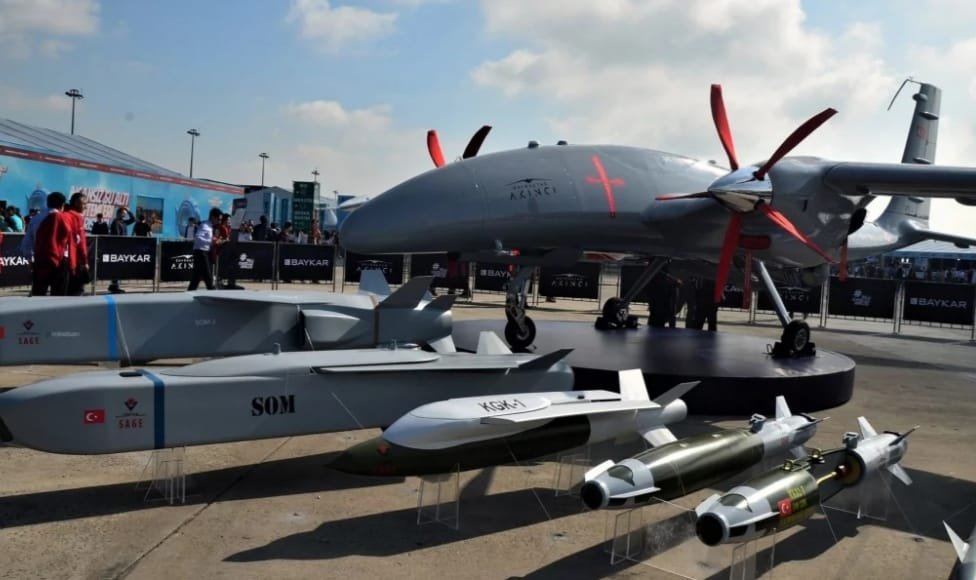
AKINCI UCAV Integrates New ALPAGUT Loitering Munition from ROKETSAN/STM
During a recent flight test, images of which were revealed on the X account of @Defence_IDA on August 17, 2024, a prototype of the ALPAGUT loitering munition, jointly developed by ROKETSAN and STM, was spotted mounted under the wing of an AKINCI combat drone (UCAV) designed by Baykar. This test also involved other advanced munitions such as the MAM-T, guided by IIR/TV, and the TEBER-82, equipped with wings to enhance its range and accuracy.
The AKINCI, Baykar’s flagship product, represents a significant advancement in combat drones. Designed for reconnaissance and attack missions, the AKINCI is capable of carrying a wide range of armaments, including air-to-air missiles, guided bombs, and, as recently observed, loitering munitions like the ALPAGUT. This drone has exceptional endurance, with a flight autonomy of up to 24 hours, and it can operate at an altitude of 40,000 feet. Equipped with advanced reconnaissance and attack capabilities, the AKINCI is powered by two turboprop engines, allowing it to carry an impressive payload. Its integration of various weapon systems, such as guided munitions and smart bombs, enhances its versatility and effectiveness on the battlefield.
The ALPAGUT Loitering Munition: A New Precision Weapon
The ALPAGUT munition was first unveiled at the SAHA EXPO 2022 in Turkey, sparking great interest in its capabilities and potential deployment from the AKINCI UCAV. ALPAGUT is a propeller-driven loitering munition, meaning it can stay in flight for an extended period before diving on its target with precision. This capability allows it to monitor enemy movements and strike sensitive targets with devastating effect.
The recently observed prototype shows minor modifications compared to earlier models, although its overall design remains similar. ALPAGUT is equipped with an 11 kg warhead, sufficient to neutralize a wide range of targets such as armored vehicles and lightly fortified positions. It also boasts an impressive operational range of over 60 km, allowing the operator to precisely choose the timing and location of the attack. ALPAGUT is controlled by a ground operator, making it somewhat of a hybrid between an FPV drone and an intelligent loitering munition, similar to those developed by Russia or Rheinmetall.
A Devastating Potential for Future Operations
The integration of ALPAGUT on the AKINCI opens up new possibilities for armed forces using these systems. The combination of an advanced UCAV platform with a loitering munition offers a significant strategic advantage, enabling long-range strikes from the launcher and with a different timing. The loitering nature of the munition allows it to stay in flight for a long time before striking its target. Additionally, ALPAGUT’s autonomy and flexibility make it a formidable weapon for complex missions where avoiding enemy defenses is crucial.
With these capabilities, the AKINCI UCAV and ALPAGUT munition could play a central role in future operations led by Turkey, whether for surveillance, neutralization of high-value targets, or support for ground forces in contested environments. Today, Turkey is conducting operations in the eastern part of its territory and in a zone unilaterally declared as a buffer zone in northern Syria. ALPAGUT is therefore developed to meet the needs of these theaters of operations. Turkey has the unique characteristic of conducting operations on its own soil, where great precision is required due to the political and collateral damage implications of these operations.
The sighting of ALPAGUT under the wing of the AKINCI marks an important milestone in the evolution of combat drone capabilities. This combination of technologies demonstrates the ongoing advancements in aerial weaponry, offering increasingly sophisticated and lethal solutions for modern conflicts. The coming months will be crucial for the development and integration of these systems, as tests continue to refine their performance for eventual operational deployment.


